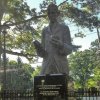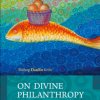Nikolić referred to the Serbian-American scientist and inventor as "the Prometheus of the modern age whose love of mankind was his strongest motivation in work."
During the ceremony in front a Tesla's laboratory on Long Island, Nikolić said that the great scientist endowed the mankind with a new philosophy of living, a new understanding of man’s possibilities, a new way to develop societies and states - a new, previously unknown possibility to create each individual life differently.
.“Just as he lit up the face the planet, so he lit up each and every man from within. He is a phenomenon, out of both his own and our time, a man who could have but never became a lover of money, who only found motivation to work and courage to cope with the lack of understanding in his love of people,” Nikolić said.
Tesla’s ideas were ahead of his time, greater than everything that science had previously created and applied, and as such, he was a man of future and a contemporary of the nowadays and of future generations, said Nikolić.
Pointing to Tesla's Serb origin and the fact that he grew up in his hometown of Smiljane by the side of his father who was an Orthodox priest and mother who used to put him asleep and wake him up with Serbian folk poems about the Battle of Kosovo, Nikolić said that, no matter how far away physically he was from the country of his birth, the brilliant scientist never forgot the answer to the question who he was and which nation and heritage he belonged to.
He never betrayed his Serbian roots, the wooden Orthodox cross on his father’s chest and the verses his mother brought him up with, but he also never forgot the support he received from America, as without its progressive and visionary thinking, his ideas would never have become a reality, Nikolić said.
He was born a Serb, died an American, and became yet another historical link that binds the two countries and peoples, Nikolić said.
The key things about him were "the Serbian people, as the nation he belonged to, and the United States, which developed his scientific potential; and still, at the beginning and end, Tesla made the whole of mankind indebted to him, who was both a Serb and American, or neither a Serb nor American, but a citizen of the world; of Tesla’s world, an illuminated world, a world of equality, such as we have not yet created but we owe him," Nikolić said, rounding off his speech.
The monument to Tesla was installed in front of the only preserved building in which he worked – the laboratory in Shoreham, New York on September 23.
The monument is the work of by sculptor Nikola Koka Janković, a member of the Serbian Academy of Sciences and Arts (SANU).
Source: B92






